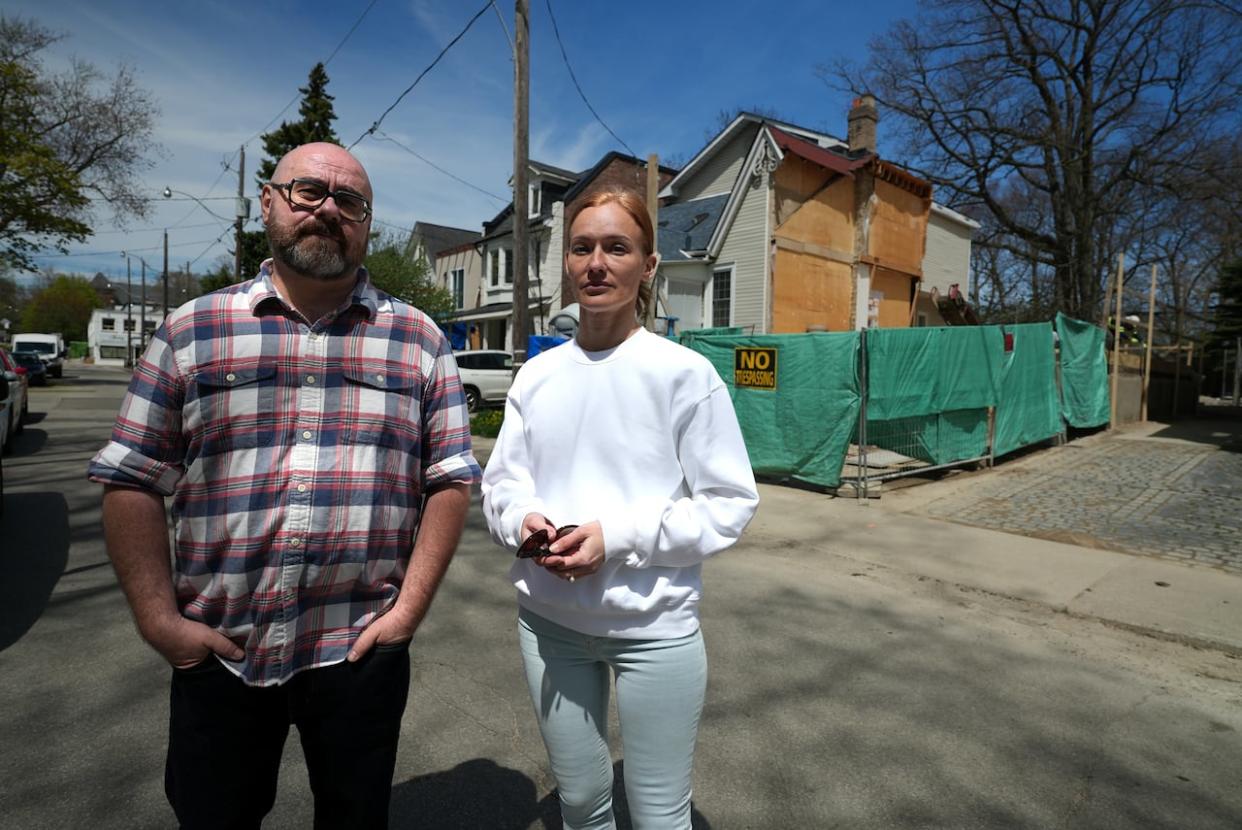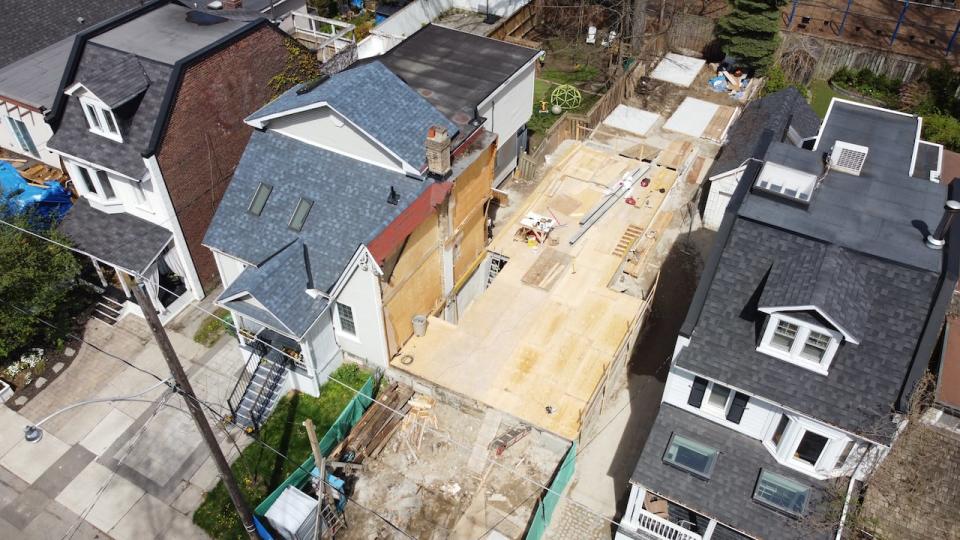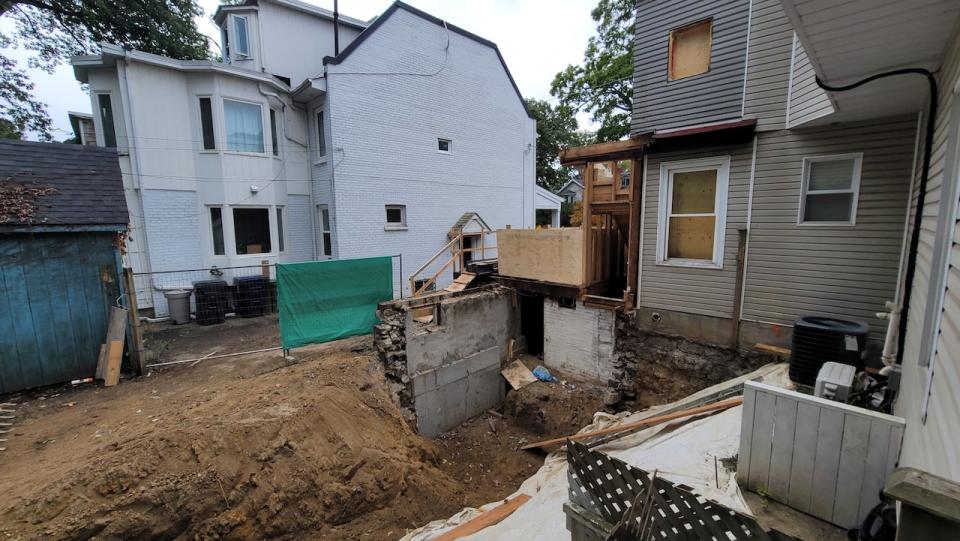Semi-detached Toronto home reno sparks bitter Beaches feud

When retirees Kathy and Pat Button started renovation plans for their Beaches home in Toronto, they reached out to their neighbours in hopes of avoiding construction conflict.
Instead, the amicable relationship has soured.
Alex and Tata Shifrin, whose Waverley Road house was separated from the Buttons' by a shared party wall, initially supported the project, which the City of Toronto approved in 2022-23.
But after construction started last fall, the Shifrins have taken their neighbours to court, saying it went beyond what they thought they'd agreed to, jeopardizing their own plans to sell their house and sense of safety — something the Buttons dispute, though the project was hit with a permit violation.
"When you get into a semi, this is the worst-case nightmare that you can imagine," Alex Shifrin said in an interview.
WATCH | Renovation went beyond initial agreement, neighbours say
The conflict is now heading to court, offering a cautionary tale of the potential pitfalls of undertaking extensive renovations in close proximity to neighbours.
A property lawyer who isn't involved in the case says she's seeing more neighbourly disagreements in Toronto's real estate market.
"Due to the prices of homes in Toronto, people are electing to renovate their home instead of selling and purchasing a new one," said Tanya Walker.
"Or people are sometimes relocating … and then undertaking a significant amount of work … that might cause tension with their neighbour."
Neighbours initially agreed on plans
City records show the renovations included altering the Buttons' existing one-storey home by constructing second-storey and rear additions, a new front porch and a new ground floor deck with a basement walkout.
Alex said he provided a letter of support and another consenting to a permit after the Buttons agreed to keep them informed and address safety concerns for his three young children, including blocking access during construction.
The Toronto and East York committee of adjustment approved the Buttons' plans in August 2022, and the city issued building permits seven months later.
Tata said she was shocked when she came home one day in October 2023 to find most of her neighbour's house being torn down.
"What we were sold on and what happened are very different things," Alex said.
"A renovation and an addition became a demolition and excavation."

Retirees Kathy and Pat Button say they shared their renovations with the Shifrins and other neighbours and got letters of support even before the city approved the project in 2022-23. (Paul Borkwood/CBC)
The Shifrins say their neighbour's renovation project has cracked walls and ceilings inside their 120-year-old wooden home, the excavation encroached onto their property without their permission and squirrels and raccoons entered the inner roof space through a hole left during construction.
A structural engineer they paid to do a visual inspection found three major cracks inside the home and suggested they could have happened during construction.
"The children were afraid to sleep in their own bedroom because raccoons were tearing squirrels apart," Tata said.
Homeowners say reno scope only changed for safety
The Buttons say their permit allowed them to partially demolish the existing house, and to excavate 2.5 feet onto their neighbour's property to build a new party wall.
The couple disputes the Shifrins' characterization that the scope of the project changed, adding neighbours received public notices and all relevant documents were available on the city website.
"The drawings that we gave them [in] September 2020 have never changed. Some interior walls have moved around a little bit, but not since 2022," Kathy Button said in an interview.
"To suggest that they didn't understand what [the party wall agreement] meant is untrue."
However, construction was not without a misstep: the Buttons admit their early October removal of what was left of two walls was beyond the scope of their permit.
A letter from a structural engineering firm the Buttons provided to the city states the walls were "not suitable for providing structural support for the floor above" due to water and termite damage and recommended they be replaced.

The Shifrins have filed a lawsuit against the Buttons. The Buttons say they plan to refute it. (Submitted by Tata Shifrin)
Kathy Button said they removed the walls immediately to prevent them from falling down over the Thanksgiving long weekend, with rain and wind in the forecast. Button said they informed a city inspector who was supervising the work.
"Those walls came down to keep people safe," she said.
Button said her engineer applied for an updated building permit following the weekend, though the city — after receiving a complaint — issued an "order to comply" on Oct. 20, noting "more than 50 per cent of the existing exterior walls were demolished" contrary to the existing permit. Construction was ordered to stop until the proper permit was obtained.
Construction resumes as conflict heads to court
The city issued a new permit in March, and construction has since resumed.
A city spokesperson said in an email that the Buttons' initial permit allowed demolition and excavation, noting the only major design change from the initial permit to the recent one was the removal of more than 50 per cent of the existing walls, which resulted in the project being considered a "new dwelling," rather than additions to an existing one.
That same month, the Shifrins filed a statement of claim at the Ontario Superior Court of Justice seeking $200,000 in damages.
They allege the demolition and excavation was done negligently, without their consent or the necessary permits, and they argue the Buttons trespassed by excavating part of their backyard without permission. None of the allegations have been proven in court.
The Buttons have yet to file a statement of defence, but say they intend to provide evidence to refute the Shifrins' claims in their response.
Kathy Button said "there was never a safety issue" and they prioritized the well-being of the Shifrins' children.
"We were very friendly until October," she said. "At every step of the way, we actually over-consulted, because we're not builders ... and we don't pretend to be."
The city spokesperson said the building department encourages permit holders to discuss construction with their neighbours and to remedy damages within a reasonable period, noting the city only has so much power to intervene.
Walker, the property lawyer, said she advises her clients to resolve neighbourly disputes through mediation or a settlement meeting with a judge, rather than going to trial.
"It makes it a little bit more difficult to live beside your neighbor if you've lost or won a court case against them," Walker said.
The Shifrins, who separated prior to construction beginning, say they plan to sell.

